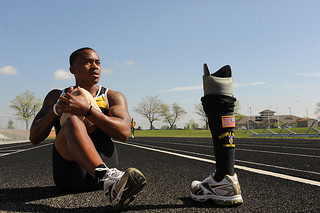I take issue with the phrase, “What doesn’t kill you makes you stronger.” (Random mental asides in quotations.)

First of all, we live in a complicated world. Shades of grey fill our lives. The probability of a random thing being either black or white is zero. (Note: mathematically speaking, that does not mean impossible.)
Therefore, all things lie on a spectrum.
“What doesn’t kill you makes you stronger” acknowledges this. It doesn’t say you are dead vs. alive, but establishes a continuum from dead to now to stronger. (That’s a bad spectrum to start with. Dead vs. Alive and Weak vs. Strong are not necessarily correlated, let alone causal. And, medically speaking, what does half-alive mean, anyway? Brain-dead? Or is it more like half-pregnant?)
For the sake of argument, our spectrum will be dead to now to stronger. (Enough with the asides, already. I’ll start telling it straight.)
My issue is thus: something which does not kill you can still move you closer to the dead side of the spectrum, such as disabled.
For example, let’s consider soldiers. With the War on Terror these last twelve years, our country has seen many disabled soldiers return home. These soldiers have various types of disabilities, ranging from missing limbs to mental and emotional problems due to Post Traumatic Stress Disorder (PTSD).
Consider first those that are physically disabled, such as an amputated leg or two. Their leg will never grow back. Physically, they have been made weaker, or moved closer to the dead side of our spectrum. This counters the phrase, “What doesn’t kill you makes you stronger.”
However, I acknowledge that many different forms of strength exist. An event may physically disable a person, but, during the course of dealing with the disability, the person may gain mental and emotional strength. In that way, the phrase, “What doesn’t kill you makes you stronger” could be judged true.
Now, let’s consider a mental or emotional disability, such as PTSD. Yes, some soldiers may make a full recovery, but what about those that never do? Do they gain any type of strength in return, like their physically disabled counterparts might?
These people are soldiers; they start out physically strong. And now they’ve been weakened mentally. Their time on the front moved them closer to the dead side of the spectrum, with no arguable “strength” given in return. For these folk, the phrase, “What doesn’t kill you makes you stronger” is patently false.
The phrase, “What doesn’t kill you makes you stronger” is not always true. That is a risk each person must take. And, like all risk, is it worth it?
I write about this now because I’ve heard that phrase quite a bit lately in regards to try-outs for the roller derby team.
As a member of a recreational league, I’ve been flooded with talk of how I should try out for the competitive parent league. One of the primary arguments states that, even if you don’t want to be on the team, or you’re not ready to be on the team, tryouts would be a good experience. Why not? What doesn’t kill you makes you stronger.
I disagree. Tryouts are four hours of intense physical challenge. Normal practice for both the recreational and competitive leagues is only two hours. Being physically OK in practice does not mean one should do tryouts. It is like telling everyone who just finished a half marathon that they’re ready to go run the marathon next week.
Like in running, doubling your volume of heavy exertion is a bad idea. It often leads to injury.
I know this from current experience.
In preparation for tryouts, there have been a series of two hour clinics. Although I don’t intend on trying out, I’ve attended some of these clinics for the additional time on skates and the instruction. One clinic immediately followed my normal practice, producing a four hour block.
I attended the four hour block, and pushed hard. Now, I’m paying for it.
For the last several weeks, I’ve had on-and-off pain in my foot. Roller skates exacerbate the pain. At the end of last week’s two hour practice, my foot screamed bloody murder at me.
I just returned from the foot doctor’s office. Two of my little bones are inflamed. He does not want me to run. I have my first 5K of the season in two weeks.
In my case, the phrase, “What doesn’t kill you makes you stronger” was false. The tryout-like experience weakened me. It wasn’t worth it.
What do you think about the phrase, “What doesn’t kill you makes you stronger”? Share in the comments below.
Note: Thank you to all those who served our country. If you were hurt in any way during your time of service, I wish you a full and speedy recovery.
*Photo credit: Army Medicine, Flickr Creative Commons License



Leave a Reply